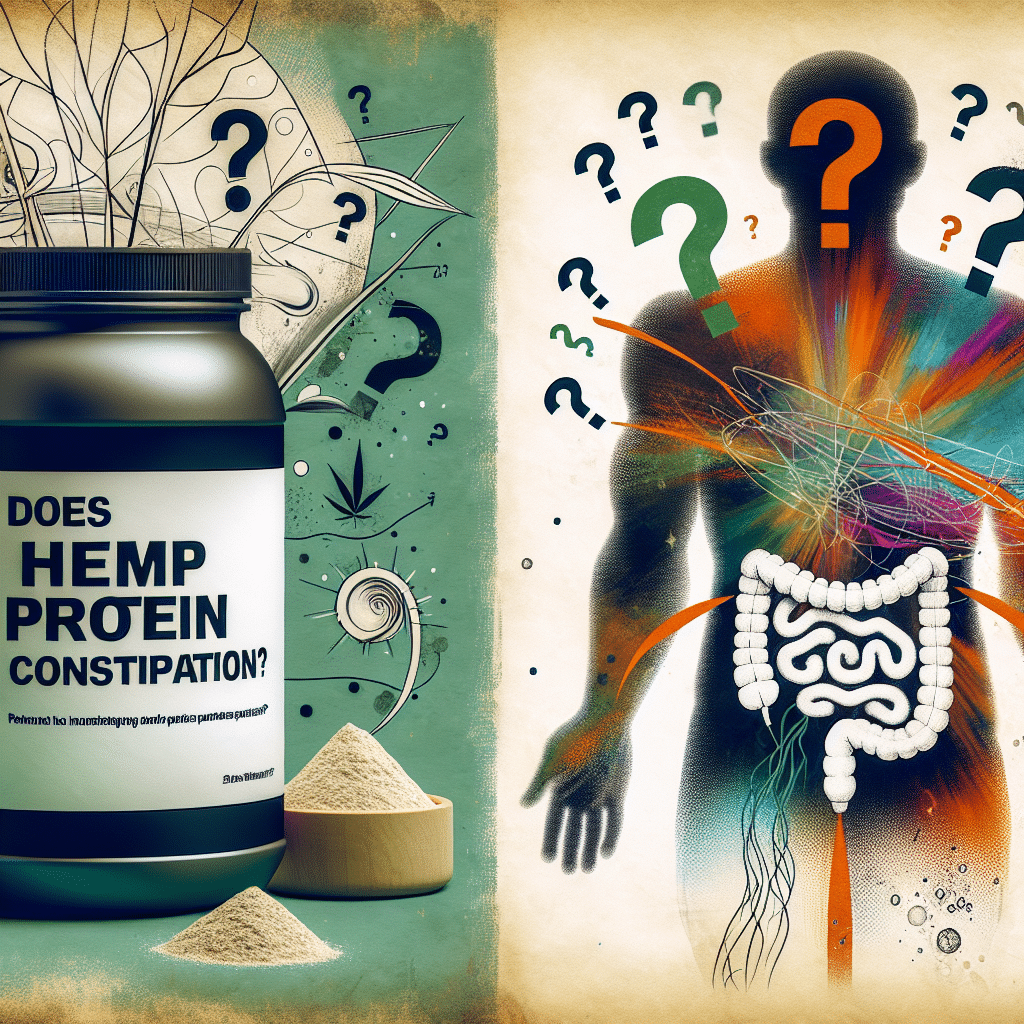Does Hemp Protein Cause Constipation?
-
Table of Contents
- Hemp Protein and Digestive Health: Does It Cause Constipation?
- Understanding Hemp Protein
- Nutritional Profile of Hemp Protein
- Does Hemp Protein Cause Constipation?
- The Role of Fiber in Digestive Health
- Hemp Protein’s Fiber Content
- Case Studies and Research
- Personal Tolerance and Digestive Response
- How to Incorporate Hemp Protein Without Causing Constipation
- Comparing Hemp Protein to Other Protein Sources
- Conclusion: Balancing Hemp Protein Intake for Optimal Digestive Health
- Discover ETprotein’s High-Quality Hemp Protein Products
Hemp Protein and Digestive Health: Does It Cause Constipation?

As the popularity of plant-based diets continues to rise, so does the demand for alternative protein sources. Hemp protein, derived from the seeds of the hemp plant, has emerged as a nutritious option for those seeking a non-animal protein. However, with its increasing use, questions about its effects on digestive health have surfaced, particularly regarding its potential to cause constipation. This article delves into the relationship between hemp protein and constipation, examining the evidence to provide a clear understanding of its impact on gut health.
Understanding Hemp Protein
Hemp protein is made by grinding the seeds of the Cannabis sativa plant into a fine powder. Unlike other parts of the cannabis plant, hemp seeds contain only trace amounts of THC, the psychoactive compound, making them safe and legal for consumption. Hemp protein is not only rich in essential amino acids but also contains fiber, healthy fats, and minerals.
Nutritional Profile of Hemp Protein
The nutritional composition of hemp protein is one of its standout features. It typically contains:
- Complete protein with all nine essential amino acids
- Dietary fiber, both soluble and insoluble
- Omega-3 and omega-6 fatty acids in a favorable ratio
- Important minerals like iron, magnesium, and zinc
Does Hemp Protein Cause Constipation?
Constipation is a common digestive issue characterized by infrequent bowel movements and difficulty passing stools. It can be caused by various factors, including diet, hydration, and lifestyle choices. To understand whether hemp protein contributes to constipation, it’s essential to consider its fiber content and overall dietary context.
The Role of Fiber in Digestive Health
Fiber plays a crucial role in maintaining healthy digestion. It adds bulk to the stool, which helps to keep bowel movements regular and can prevent constipation. However, increasing fiber intake too quickly or consuming it without adequate hydration can lead to digestive discomfort and constipation.
Hemp Protein’s Fiber Content
Hemp protein contains a significant amount of dietary fiber. While this is generally beneficial for digestive health, it’s important to introduce it gradually into the diet and ensure proper hydration to allow the digestive system to adjust.
Case Studies and Research
There is limited research specifically on hemp protein and constipation. However, studies on high-fiber diets consistently show that a gradual increase in fiber, along with sufficient fluid intake, can improve bowel regularity and prevent constipation.
Personal Tolerance and Digestive Response
Individual responses to hemp protein can vary. Some people may experience an increase in bowel movements and improved digestive health, while others might find that it causes bloating or constipation, especially if they are not used to consuming high-fiber diets.
How to Incorporate Hemp Protein Without Causing Constipation
To enjoy the benefits of hemp protein without risking constipation, consider the following tips:
- Start with small servings of hemp protein and gradually increase the amount.
- Drink plenty of water throughout the day to help the fiber move through your digestive system.
- Balance your diet with other sources of protein and fiber to ensure a varied nutrient intake.
- Listen to your body and adjust your hemp protein consumption if you experience any digestive discomfort.
Comparing Hemp Protein to Other Protein Sources
When compared to other plant-based proteins like pea or rice protein, hemp protein offers a unique nutritional profile with its fiber content and fatty acids. Animal-based proteins, on the other hand, typically lack dietary fiber altogether. This comparison highlights hemp protein’s potential advantage in promoting digestive health, provided it is consumed correctly.
Conclusion: Balancing Hemp Protein Intake for Optimal Digestive Health
In conclusion, while hemp protein contains dietary fiber that can support digestive health, it does not inherently cause constipation. The key to reaping its benefits without adverse effects lies in moderation, gradual introduction, and adequate hydration. By following these guidelines, most individuals can incorporate hemp protein into their diet without experiencing constipation.
Discover ETprotein’s High-Quality Hemp Protein Products
If you’re looking to incorporate hemp protein into your diet, ETprotein offers a range of high-quality protein products that can meet your needs. Their organic hemp protein is characterized by a neutral taste, non-GMO, and allergen-free attributes, making it an excellent choice for those seeking a plant-based protein source. ETprotein’s commitment to purity and quality ensures that you receive a product that not only supports your health goals but also aligns with ethical and sustainable practices.
About ETprotein:
ETprotein, a reputable protein and L-(+)-Ergothioneine (EGT) Chinese factory manufacturer and supplier, is renowned for producing, stocking, exporting, and delivering the highest quality organic bulk vegan proteins and L-(+)-Ergothioneine. They include Organic rice protein, clear rice protein, pea protein, clear pea protein, watermelon seed protein, pumpkin seed protein, sunflower seed protein, mung bean protein, peanut protein, and L-(+)-Ergothioneine EGT Pharmaceutical grade, L-(+)-Ergothioneine EGT food grade, L-(+)-Ergothioneine EGT cosmetic grade, L-(+)-Ergothioneine EGT reference grade and L-(+)-Ergothioneine EGT standard. Their offerings, characterized by a neutral taste, non-GMO, allergen-free attributes, with L-(+)-Ergothioneine purity over 98%, 99%, cater to a diverse range of industries. They serve nutraceutical, pharmaceutical, cosmeceutical, veterinary, as well as food and beverage finished product distributors, traders, and manufacturers across Europe, USA, Canada, Australia, Thailand, Japan, Korea, Brazil, and Chile, among others.
ETprotein specialization includes exporting and delivering tailor-made protein powder and finished nutritional supplements. Their extensive product range covers sectors like Food and Beverage, Sports Nutrition, Weight Management, Dietary Supplements, Health and Wellness Products, and Infant Formula, ensuring comprehensive solutions to meet all your protein needs.
As a trusted company by leading global food and beverage brands and Fortune 500 companies, ETprotein reinforces China’s reputation in the global arena. For more information or to sample their products, please contact them and email sales(at)ETprotein.com today.












